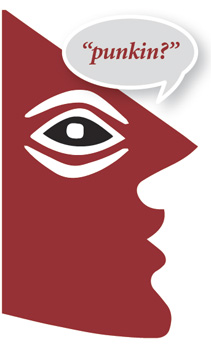|
February 2018

Issue Home >>
|

In March 2017, a Facebook meme “Name a Word Trinidadian People always mispronounce” on Slam 100.5fm and Boomchampionstt.com elicited over 500 reactions, over 1,500 shares, and over 1,000 comments and contributions. Many of the comments were based on popular misconceptions about language in general, and about Trinidadian speech in particular. While some comments were good-natured and humorous, the general tone ranged from condescension to mockery to horror, signalling both a lack of awareness of the huge variation in the English language across the Caribbean and across the globe, and an often disparaging attitude towards both Trinidadian English and of Trinidadian English Creole. There are obvious implications for language and education, language and social equity and justice, language and nationhood, and language and psychological well-being.
 Linguistics helps us understand the nature of language change over time and language variation. Here we take a look at some of these pronunciation issues raised by that popular meme. Accents are the subject of another article. Linguistics helps us understand the nature of language change over time and language variation. Here we take a look at some of these pronunciation issues raised by that popular meme. Accents are the subject of another article.
Errors? Not Just a Trinidadian Thing
Speakers of English around the world confuse pacific for specific, prostrate for prostate and much more. There has also been a great deal written about past errors that are the source of present pronunciations in English. David Shariatmadari’s article “8 pronunciation errors that made the English language what it is today”, published by The Guardian in March 2014, is particularly accessible and helpful. Change, though constant, never comes easy. What is accepted today may once have faced outrage, just as what is rejected today may one day be the face of tomorrow.
Both modern Caribbean English and Caribbean English Creoles share close connections with aspects of Early Modern English (EModE) varieties which are the ones that settled here, not prescribed and standardised Present Day English (PDE) which came later. We would do well to study those EModE varieties, with all their echoes here, instead of only PDE, which we must also use in our writing and other media.
Shakespeare might have said “the cyat was hiding in the gyarden”. He might also have said buss, cuss, fuss, nuss, wuss, for burst, curse, first, nurse, worse, and more. He definitely would have heard hoss for horse.
Historical Phonology: Different Emphases on Different Syllables
*Character - CHAracter or chaRACter?
The pronunciation with the second syllable stressed is the earlier pronunciation that sailed the Atlantic around Shakespearean times and stayed here in the Caribbean (and some parts of the USA). Other words that used to have the stress on the second syllable include conTEMplate, balCOny, deCAdent, soNOrous, and many more. That chaRACter was right for one period of English language history but not now is an issue of fashion.
Modern International Synchronic Variation
There is an increasing familiarity with and respect for General American norms, what with increasing physical and virtual access to the USA. This increasing contact also seems to parallel increasing distance from the older Trinidadian self almost to the point of mockery, scorn and derision, even a strained relationship with traditional local and national norms. This is to the point that some of the comments did not know that forehead does rhyme with horrid, Maths and Math are both “acceptable” and that schedule developed two current pronunciations (but lost its original pronunciation of sedule from Old French cedule).
 Phonology: Vowel/Syllable Deletion (Apocope) Phonology: Vowel/Syllable Deletion (Apocope)
The deletion of an unstressed vowel (leading therefore to a reduction in the number of syllables) is common and normal, as in chocolate which has two syllables these days (in English). This is the reason for the way we pronounce library and secretary and more with two syllables (like other speakers of English):
Phonology: Insertion (Epenthesis)
Icing, fishing and flowering sometimes get an extra consonant, and athlete and translation sometimes get an extra vowel. The process is called epenthesis. Insertion and deletion processes fix syllable structure to match existing syllable norms or templates, sometimes by analogy with similar sounding words.
Phonology: Switching Sounds (Metathesis)
If flim and cripsy are wrong, then all English speakers should revert to waps for wasp, hros for horse, brid for bird, tronado for tornado, brust for burst, birght for bright and other such examples!
*Aks and Ask they came from the verbs acsian and ascian, respectively. People have been saying both for 1,200 years.
*Film and Flim. Why do speakers say flim? Take the [lm] challenge and name 10 words that end with [lm], where the [l] is actually pronounced. (These can’t include those words with a silent but once pronounced <l> as in calm, palm, etc.; a word like balm never had the added <l> pronounced as it came to English via French, and is related to Modern French baume.) Other varieties handle this [lm] problem by breaking up the sequence with a vowel, like some varieties of Irish English. Now name 10 words that start with [fl] - much easier. So, deletion, insertion and metathesis are all skilful coping strategies to deal with any pronunciation problem.
Kumar for kurma is a type of metathesis too.
Phonology: Assimilation
For most speakers of English, the "s" in news by itself is different from the "s" in newspaper. In the second instance, it sounds like an [s], but in the first, like a [z]. Assimilation also happens when pigtail sounds like picktail and Princes Town sounds like Princess Town. It is due to assimilation for ease of articulation. Assimilation explains punkin for pumpkin, and sangwich for sandwich. Assimilation also explains choon for tune, and Chuesday for Tuesday (and historically explains why sure and sugar have a <sh> sound at the beginning).
(Mis)pronunciations are just the tip of the iceberg. Lexico-semantics is another area of great interest to language users. See more on our languageblag.com. So language exploration is as deep as it is wide, and the Linguistics Sections on all UWI campuses, along with the Society for Caribbean Linguistics, stand ready to discuss and research all manner of language and language-related issues.
Bob said it: “If you know your history, then you would know where you coming from” (Buffalo Soldier).
|





